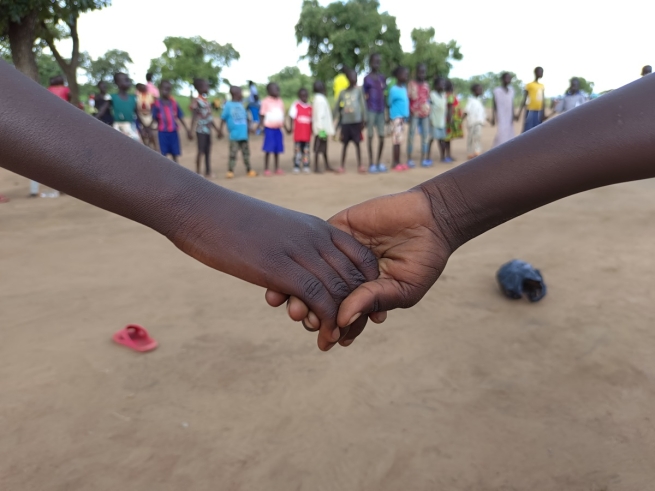Palabek is not the typical African refugee camp known from the media, but rather a settlement where local Ugandans from the north of the country and newcomers mainly from South Sudan live together. The border area has become home to more than 70 000 refugees, 60% of whom are under the age of 13. The people of Palabek speak the Acholi language, both those from Uganda and South Sudan. Milton Obote, the former president of Uganda was actually from the Acholi people - twice elected to the post and considered the ‘father of independence’ for Uganda. The settlement opened in 2016 in response to a growing wave of South Sudanese refugees fleeing the brutal armed conflict in their country. The site provides a safe haven for many people who have lost their homes and loved ones to conflict, violence and persecution.
The Salesians have been working in Palabek since 2017. They have established schools, a parish, built a church and 17 chapels in nearby villages, help with education, food distribution and pastoral work. They organise young people’s leisure time through sports and music and place a strong emphasis on education, including a vocational training centre (VTC). Education is one of the most effective tools young refugees can use to build their future. "Rebuilding lives" is the inscription on the T-shirts of the VTC boys - the Salesians are helping to rebuild lives destroyed by hatred and war.
Fr Ubaldino Andrade SDB, who works at the mission, says the challenges are a whole long list. "We need more Salesians to work. Many young people are growing up without the care of parents who have returned to South Sudan. They leave their children in the care of others, putting their development at risk," he adds.
The Salesian explains that the refugees live in extreme poverty, working hard every day to survive, eating very little, sometimes only once a day. Many minors are forced to leave school to work breaking stones, making coal, or collecting firewood, to work in agriculture, planting maize or looking after animals. The few who manage to go to school have to walk long distances, sometimes 10 or 15 kilometres one way, without educational materials or food. Quite a few girls become pregnant and drop out of school. Many youngsters become mothers and fathers at a very young age, with no livelihood, no experience, no job.
Uganda is known for its unique and humanitarian refugee policy. The country welcomes refugees with open arms and grants them the right to work and freedom of movement. This approach differs from the situation in many other countries, which often restrict the movement and employment opportunities of newcomers. Despite the difficult living conditions and the trauma, they have gone through, refugees in the Palabek settlement form a community based on mutual support and solidarity. Local authorities and NGOs are working to ensure security and maintain peace in the settlement. It is also worth noting that residents of the surrounding villages and towns often share their resources with the refugees and help them integrate.
In Uganda, refugee camps and settlements are home to newcomers from Ethiopia, Somalia, Congo, Rwanda, Burundi, Eritrea, Sudan, and South Sudan. According to the UNHCR (United Nations High Commissioner for Refugees), there are currently almost 1.5 million refugees in the country, with around 70,000 living in Palabek alone. 83 per cent are women and children and 25 per cent are young people aged 15-24 (2022 figures).
Fr Maciej Makula, SDB
https://www.infoans.org/en/sections/news/item/19061-uganda-palabek-this-is-not-a-refugee-camp#sigProIdc4d88a8ae2



